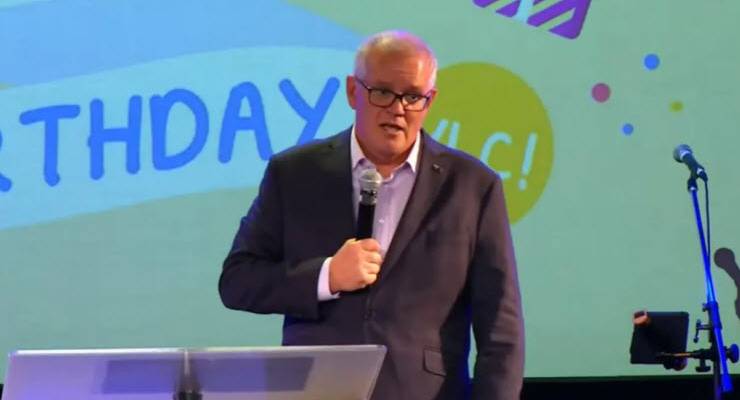
For a man who has devoted most of his life trying to get into government, Scott Morrison sure has a low opinion of them. After an unsuccessful career in tourism marketing, he moved from political party machine man to MP and, eventually, to the prime ministership. Now he says you shouldn’t trust government.
Affecting the air of a grizzled veteran, one who has been there done that, Morrison now declares: “As someone who’s been in it, if you are putting your faith in those things, like I put my faith in the Lord, you are making a mistake.”
It’s reminiscent of when a bitter Mark Latham, having spectacularly flamed out as Labor leader, left politics and warned young Australians not to waste their time with parliamentary politics. Inevitably, Latham has since decided parliamentary politics really are worthwhile after all, having found a political party that would have him.
Morrison has previously spoken about the importance of building communities in his religious ideology — though only communities he approves of (religious ones), not ones based on “identity politics”. Morrison — who has cherrypicked religious and philosophical ideas into a confused mess — believes that communities and families are what should provide our rights, not states, which rights protect us from.
In practice, he utterly failed to implement this vision. He permanently increased the size of government. He used draconian powers during the pandemic. He undermined communities through divisive politics.
That doesn’t diminish the sincerity of his belief that you can’t trust government, that you shouldn’t rely on the state. Morrison’s conviction that government is a bad thing reflects not his experience of government — his government was indeed untrustworthy and unreliable — but his privilege, and that of his own “community” of Pentecostalist believers.
As a community of privileged, mainly white, middle-class people who believe God intervenes directly and regularly in their lives and will provide them material as well as spiritual and emotional success, religious groups such as Hillsong and Morrison’s own Horizon church don’t regard government as a positive social force. They have no need of government — God will provide them with the prosperity they believe they deserve. Indeed government can be an active threat to them, through taxation, through ending discrimination against groups demonised by Pentecostalists, through withholding the generous tax concessions they believe they’re entitled to.
For other people who aren’t as privileged as they are, and who may need the support of government, the real answer is to turn to God, who will shower prosperity upon you as a result.
This is only a theological version of neoliberalism, which views government as an evil that must be minimised so that the wealthy and powerful can act unencumbered by any responsibilities to the rest of society.
Or perhaps it’s more reasonable to see neoliberalism as simply another aspect of prosperity theology, given the lack of evidence and inconsistencies that plague the economic philosophy.
Powerful, privileged people explaining why they have no responsibility towards others and shouldn’t be burdened with the consequences of government. It’s all about community — but just your community, not anyone else’s.








Thank Christ – if you’ll pardon the pun – we only had him for three years!
Could not have put that better myself, jayho!!
(And that was certainly three years too many.)
…four…
So basically he lead by example: You shouldn’t trust Government, ergo his Government was the least trustworthy in history. QED. He and his ministry treated us all with utter contempt and deserve the same back, in spades.
Scotty the scammer. Will he start his own church? Probably too much like hard work. I’m thinking cooking show?
Cooking what? – Books?
Well, you’d distrust your employer too if they kept sacking from all the cushy jobs you managed to carpetbag over the years, including even an international government. For no good reason. (Incompetence and scamming are not good reasons)
Nice link drawn there between Morrison and Latham – thanks BK.
I keep recalling how many comments I read before 21 May that worried about how Albanese was an unknown and therefore not to be trusted as leader. Compared with Morrison PM Albanese is an open book.